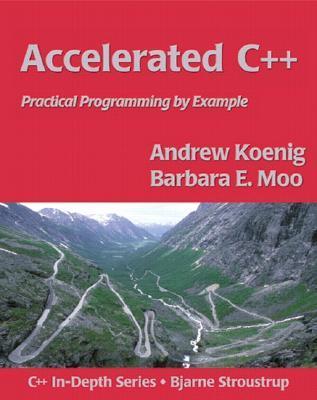What do you think?
Rate this book


352 pages, Paperback
First published August 1, 2000
Synopsis:
This is a first-rate introductory book that takes a practical approach to solving problems using C++. It covers a much wider scope of C++ programming than other introductory books I've seen, and in a surprisingly compact format.
—Dag Brück, founding member of the ANSI/ISO C++ committee
The authors present a clear, cogent introduction to C++ programming in a way that gets the student writing nontrivial programs immediately.
—Stephen Clamage, Sun Microsystems, Inc., and chair of the ANSI C++ committee
Anyone reading just this one book and working through the examples and exercises will have the same skills as many professional programmers.
—Jeffrey D. Oldham, Stanford University
Why is Accelerated C++ so effective? Because it
Starts with the most useful concepts rather than the most primitive ones: You can begin writing programs immediately. Describes real problems and solutions, not just language features: You see not only what each feature is, but also how to use it. Covers the language and standard library together: You can use the library right from the start.The authors proved this approach in their professional-education course at Stanford University, where students learned how to write substantial programs on their first day in the classroom.
Whether you are eager to get started writing your first C++ programs, or you are already using C++ and seeking deeper understanding, the authors' unique approach and expertise make Accelerated C++ an indispensable addition to your library.
Booknews:
The unconventional approach of this textbook starts with the most useful parts of C++ rather than the most primitive ones, introducing the language and standard library together from the very beginning. The authors concentrate more on solving problems than on exploring language and library features. Annotation c. Book News, Inc., Portland, OR (booknews.com)
Biography:
Andrew Koenig is a member of the Large-Scale Programming Research Department at AT&T's Shannon Laboratory, and the Project Editor of the C++ standards committee. A programmer for more than 30 years, 15 of them in C++, he has published more than 150 articles about C++, and speaks on the topic worldwide.
Barbara E. Moo is an independent consultant with 20 years' experience in the software field. During her nearly 15 years at AT&T, she worked on one of the first commercial products ever written in C++, managed the company's first C++ compiler project, and directed the development of AT&T's award-winning WorldNet Internet service business.
0